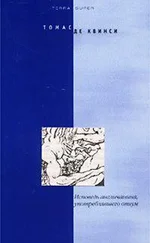Томас Де Квинси - Note Book of an English Opium-Eater
Здесь есть возможность читать онлайн «Томас Де Квинси - Note Book of an English Opium-Eater» — ознакомительный отрывок электронной книги совершенно бесплатно, а после прочтения отрывка купить полную версию. В некоторых случаях можно слушать аудио, скачать через торрент в формате fb2 и присутствует краткое содержание. Жанр: foreign_prose, literature_19, foreign_antique, на английском языке. Описание произведения, (предисловие) а так же отзывы посетителей доступны на портале библиотеки ЛибКат.
- Название:Note Book of an English Opium-Eater
- Автор:
- Жанр:
- Год:неизвестен
- ISBN:нет данных
- Рейтинг книги:5 / 5. Голосов: 1
-
Избранное:Добавить в избранное
- Отзывы:
-
Ваша оценка:
- 100
- 1
- 2
- 3
- 4
- 5
Note Book of an English Opium-Eater: краткое содержание, описание и аннотация
Предлагаем к чтению аннотацию, описание, краткое содержание или предисловие (зависит от того, что написал сам автор книги «Note Book of an English Opium-Eater»). Если вы не нашли необходимую информацию о книге — напишите в комментариях, мы постараемся отыскать её.
Note Book of an English Opium-Eater — читать онлайн ознакомительный отрывок
Ниже представлен текст книги, разбитый по страницам. Система сохранения места последней прочитанной страницы, позволяет с удобством читать онлайн бесплатно книгу «Note Book of an English Opium-Eater», без необходимости каждый раз заново искать на чём Вы остановились. Поставьте закладку, и сможете в любой момент перейти на страницу, на которой закончили чтение.
Интервал:
Закладка:
Vain would be all attempts to convey the horror which thrilled the gathering spectators of this piteous tragedy. It was known to the crowd that one person had, by some accident, escaped the general massacre: but she was now speechless, and probably delirious; so that, in compassion for her pitiable situation, one female neighbor had carried her away, and put her to bed. Hence it had happened, for a longer space of time than could else have been possible, that no person present was sufficiently acquainted with the Marrs to be aware of the little infant; for the bold pawnbroker had gone off to make a communication to the coroner; and another neighbor to lodge some evidence which he thought urgent at a neighboring police-office. Suddenly some person appeared amongst the crowd who was aware that the murdered parents had a young infant; this would be found either below-stairs, or in one of the bedrooms above. Immediately a stream of people poured down into the kitchen, where at once they saw the cradle—but with the bedclothes in a state of indescribable confusion. On disentangling these, pools of blood became visible; and the next ominous sign was, that the hood of the cradle had been smashed to pieces. It became evident that the wretch had found himself doubly embarrassed— first, by the arched hood at the head of the cradle, which, accordingly, he had beat into a ruin with his mallet, and secondly, by the gathering of the blankets and pillows about the baby's head. The free play of his blows had thus been baffled. And he had therefore finished the scene by applying his razor to the throat of the little innocent; after which, with no apparent purpose, as though he had become confused by the spectacle of his own atrocities, he had busied himself in piling the clothes elaborately over the child's corpse. This incident undeniably gave the character of a vindictive proceeding to the whole affair, and so far confirmed the current rumor that the quarrel between Williams and Marr had originated in rivalship. One writer, indeed, alleged that the murderer might have found it necessary for his own safety to extinguish the crying of the child; but it was justly replied, that a child only eight months old could not have cried under any sense of the tragedy proceeding, but simply in its ordinary way for the absence of its mother; and such a cry, even if audible at all out of the house, must have been precisely what the neighbors were hearing constantly, so that it could have drawn no special attention, nor suggested any reasonable alarm to the murderer. No one incident, indeed, throughout the whole tissue of atrocities, so much envenomed the popular fury against the unknown ruffian, as this useless butchery of the infant.
Naturally, on the Sunday morning that dawned four or five hours later, the case was too full of horror not to diffuse itself in all directions; but I have no reason to think that it crept into any one of the numerous Sunday papers. In the regular course, any ordinary occurrence, not occurring, or not transpiring until fifteen minutes after 1 A. M. on a Sunday morning, would first reach the public ear through the Monday editions of the Sunday papers, and the regular morning papers of the Monday. But, if such were the course pursued on this occasion, never can there have been a more signal oversight. For it is certain, that to have met the public demand for details on the Sunday, which might so easily have been done by cancelling a couple of dull columns, and substituting a circumstantial narrative, for which the pawnbroker and the watchman could have furnished the materials, would have made a small fortune. By proper handbills dispersed through all quarters of the infinite metropolis, two hundred and fifty thousand extra copies might have been sold; that is, by any journal that should have collected exclusive materials, meeting the public excitement, everywhere stirred to the centre by flying rumors, and everywhere burning for ampler information. On the Sunday se'ennight (Sunday the octave from the event), took place the funeral of the Marrs; in the first coffin was placed Marr; in the second Mrs. Marr, and the baby in her arms; in the third the apprentice boy. They were buried side by side; and thirty thousand laboring people followed the funeral procession, with horror and grief written in their countenances.
As yet no whisper was astir that indicated, even conjecturally, the hideous author of these ruins—this patron of grave-diggers. Had as much been known on this Sunday of the funeral concerning that person as became known universally six days later, the people would have gone right from the churchyard to the murderer's lodgings, and (brooking no delay) would have torn him limb from limb. As yet, however, in mere default of any object on whom reasonable suspicion could settle, the public wrath was compelled to suspend itself. Else, far indeed from showing any tendency to subside, the public emotion strengthened every day conspicuously, as the reverberation of the shock began to travel back from the provinces to the capital. On every great road in the kingdom, continual arrests were made of vagrants and 'trampers,' who could give no satisfactory account of themselves, or whose appearance in any respect answered to the imperfect description of Williams furnished by the watchman.
With this mighty tide of pity and indignation pointing backwards to the dreadful past, there mingled also in the thoughts of reflecting persons an under-current of fearful expectation for the immediate future. 'The earthquake,' to quote a fragment from a striking passage in Wordsworth—
'The earthquake is not satisfied at once.'
All perils, specially malignant, are recurrent. A murderer, who is such by passion and by a wolfish craving for bloodshed as a mode of unnatural luxury, cannot relapse into inertia . Such a man, even more than the Alpine chamois hunter, comes to crave the dangers and the hairbreadth escapes of his trade, as a condiment for seasoning the insipid monotonies of daily life. But, apart from the hellish instincts that might too surely be relied on for renewed atrocities, it was clear that the murderer of the Marrs, wheresoever lurking, must be a needy man; and a needy man of that class least likely to seek or to find resources in honorable modes of industry; for which, equally by haughty disgust and by disuse of the appropriate habits, men of violence are specially disqualified. Were it, therefore, merely for a livelihood, the murderer whom all hearts were yearning to decipher, might be expected to make his resurrection on some stage of horror, after a reasonable interval. Even in the Marr murder, granting that it had been governed chiefly by cruel and vindictive impulses, it was still clear that the desire of booty had co-operated with such feelings. Equally clear it was that this desire must have been disappointed: excepting the trivial sum reserved by Marr for the week's expenditure, the murderer found, doubtless, little or nothing that he could turn to account. Two guineas, perhaps, would be the outside of what he had obtained in the way of booty. A week or so would see the end of that. The conviction, therefore, of all people was, that in a month or two, when the fever of excitement might a little have cooled down, or have been superseded by other topics of fresher interest, so that the newborn vigilance of household life would have had time to relax, some new murder, equally appalling, might be counted upon.
Such was the public expectation. Let the reader then figure to himself the pure frenzy of horror when in this hush of expectation, looking, indeed, and waiting for the unknown arm to strike once more, but not believing that any audacity could be equal to such an attempt as yet, whilst all eyes were watching, suddenly, on the twelfth night from the Marr murder, a second case of the same mysterious nature, a murder on the same exterminating plan was perpetrated in the very same neighborhood. It was on the Thursday next but one succeeding to the Marr murder that this second atrocity took place; and many people thought at the time, that in its dramatic features of thrilling interest, this second case even went beyond the first. The family which suffered in this instance was that of a Mr. Williamson; and the house was situated, if not absolutely in Ratcliffe Highway, at any rate immediately round the corner of some secondary street, running at right angles to this public thoroughfare, Mr. Williamson was a well-known and respectable man, long settled in that district; he was supposed to be rich; and more with a view to the employment furnished by such a calling, than with much anxiety for further accumulations, he kept a sort of tavern; which, in this respect, might be considered on an old patriarchal footing—that, although people of considerable property resorted to the house in the evenings, no kind of anxious separation was maintained between them and the other visitors from the class of artisans or common laborers. Anybody who conducted himself with propriety was free to take a seat, and call for any liquor that he might prefer. And thus the society was pretty miscellaneous; in part stationary, but in some proportion fluctuating. The household consisted of the following five persons:—1. Mr. Williamson, its head, who was an old man above seventy, and was well fitted for his situation, being civil, and not at all morose, but, at the same time, firm in maintaining order; 2. Mrs. Williamson, his wife, about ten years younger than himself; 3. a little grand-daughter, about nine years old; 4. a housemaid, who was nearly forty years old; 5. a young journeyman, aged about twenty-six, belonging to some manufacturing establishment (of what class I have forgotten); neither do I remember of what nation he was. It was the established rule at Mr. Williamson's, that, exactly as the clock struck eleven, all the company, without favor or exception, moved off. That was one of the customs by which, in so stormy a district, Mr. Williamson had found it possible to keep his house free from brawls. On the present Thursday night everything had gone on as usual, except for one slight shadow of suspicion, which had caught the attention of more persons than one. Perhaps at a less agitating time it would hardly have been noticed; but now, when the first question and the last in all social meetings turned upon the Marrs, and their unknown murderer, it was a circumstance naturally fitted to cause some uneasiness, that a stranger, of sinister appearance, in a wide surtout, had flitted in and out of the room at intervals during the evening; had sometimes retired from the light into obscure corners; and, by more than one person, had been observed stealing into the private passages of the house. It was presumed in general, that the man must be known to Williamson. And in some slight degree, as an occasional customer of the house, it is not impossible that he was . But afterwards, this repulsive stranger, with his cadaverous ghastliness, extraordinary hair, and glazed eyes, showing himself intermittingly through the hours from 8 to 11 P.M., revolved upon the memory of all who had steadily observed him with something of the same freezing effect as belongs to the two assassins in 'Macbeth,' who present themselves reeking from the murder of Banquo, and gleaming dimly, with dreadful faces, from the misty background, athwart the pomps of the regal banquet.
Читать дальшеИнтервал:
Закладка:
Похожие книги на «Note Book of an English Opium-Eater»
Представляем Вашему вниманию похожие книги на «Note Book of an English Opium-Eater» списком для выбора. Мы отобрали схожую по названию и смыслу литературу в надежде предоставить читателям больше вариантов отыскать новые, интересные, ещё непрочитанные произведения.
Обсуждение, отзывы о книге «Note Book of an English Opium-Eater» и просто собственные мнения читателей. Оставьте ваши комментарии, напишите, что Вы думаете о произведении, его смысле или главных героях. Укажите что конкретно понравилось, а что нет, и почему Вы так считаете.












